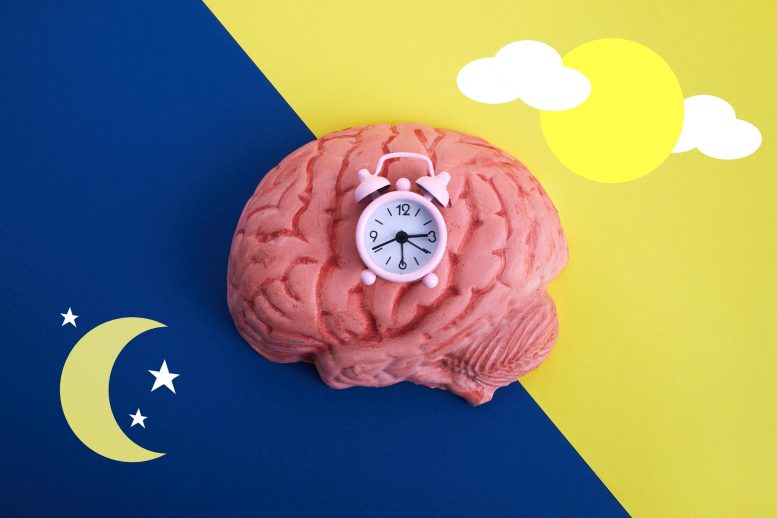
The circadian rhythm, or circadian cycle, is a natural, internal sleep-wake cycle dictated by a roughly 24-hour biological clock.
The importance of getting enough shut-eye is stressed time and time again as one cornerstone of good health. Adequate sleep has been linked to improved mood, metabolism, concentration, and immunity, among other health benefits. Yet a good night of sleep can feel elusive in our fast-paced, productivity-obsessed culture.
The human sleep-wake cycle is dictated by a roughly 24-hour biological clock called the circadian rhythm. In addition to making us sleepy at night, the circadian rhythm affects digestion, hormone secretion, body temperature, and hunger. When this cycle is disrupted by shift work, travel, childcare, Daylight Savings, or any number of factors present in the modern world, many systems in the body can become dysregulated.
Here are five simple ways to regulate your circadian rhythm to improve sleep and overall health:
- Have a regular bedtime and waketime. Keeping a fairly consistent sleep schedule is the most basic way to regulate your body’s functioning. Everybody is different, so try to find a bedtime that feels natural for your body. If you tend to get distracted or stuck in front of the TV in the evenings, try setting a reminder on your phone for an hour before you’d like to be asleep. That way, you can begin to wind down before you turn the lights out.
- Take a low dose of melatonin at sunset. While often used as a supplement, melatonin, the hormone responsible for making us sleepy, is naturally produced in our brains between sunset and sunrise. Taking 1-3 mg of a melatonin supplement every day at sunset may help your body regulate its own melatonin production. A higher dose is not always better, and individual needs vary, so start low and experiment to find an amount that works for you.
- Get sunlight in the AM. Exposure to natural light in the morning has been linked to an improved circadian rhythm. Try and get outside for at least 10 minutes as soon as possible after waking. It can be as simple as walking around the block or having a cup of coffee on the front stoop.
- Try a sunrise alarm clock. Instead of a blaring, stress-inducing alarm, these devices wake you up gently by slowly filling your room with stimulating light. This signals to your body that it’s time to wake up and start the day.
- Use blackout curtains. Blocking out natural light is crucial if you need to sleep during daylight hours due to shift work or travel. Used in conjunction with a sunrise alarm, blackout curtains can aid in mimicking nighttime and sunlight to help your body sleep.
While the importance of a well-regulated circadian rhythm can feel overwhelming, it’s nothing to lose sleep over. Try one or two of these hacks, take a deep breath, and you’ll be dozing off before you know it.







The issue is that the current lighting doesn’t offer a daytime signal, like outside. You need 490nm during your day and the WELL building standard is a good start to understand EML requirements. Also look at Skyview task lamp.
The problem with all these articles about basic sleep hygiene is that they never address diverse chronotypes, and especially circadian rhythm disorders, and how perniciously difficult they can be to manage in this early-bird-biased society. So many articles exist with the same message: “Just do some or all these things, and you’ll be able to improve your sleep, control everything about your body’s cycle, and be a perfect example of the societally accepted, sanctified and sanctioned Early-Bird.”
The early-bird chronotype is always emphasized as the ideal for everyone since the advent of 9-5 factory assembly lines (à la Henry Ford) and the industrial age. Yet, this ignorant homogeneous idealism flies in like a brick in the face of the scientific fact that everyone does not fit into such a narrow chronotype.
Evolutionary diversity has guaranteed that every person has a chronotype which cannot simply be changed by a set of simple “sleep hygiene” techniques. Any article which does not address this scientifically proven fact is like the parable of the monkey: saying “won’t you so kindly let me help you, or you’ll drown”, said the monkey putting a fish up a tree.
I was most happy to read the previous message. I have been a night person my whole life. Even as a little girl, I have fought going to sleep and it always feels like torture to get up early. To me our society is an example of day person chauvinism. When I say I got up at 10, others assume I got 10-12 hours of sleep and that I am lazy, not that I went to sleep at 2. For much of my adult life, I got up with my son to make him breakfast and get him off to school. Once he went off to college, I went right back to my late hours even though I didn’t intend to. I am a senior citizen now, still working, still a night owl.
@James Couldn’t have said it better myself!
I’m a late owl, as are all of my siblings, and our mom. I totally relate to the poster who said.”I got up at 12, but missed saying that was probably less than 8 hours after going to bed. I must admit that when I do wake up early, at 8, alert and ready to go, I can’t for the life of me think of anything that can’t wait until 10:30.